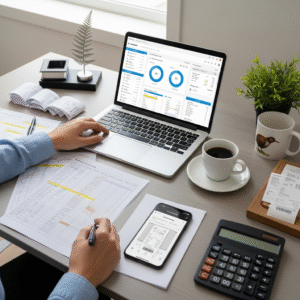How to Start an Ecommerce Business in NZ
The e-commerce market in New Zealand is growing at an amazing rate, which is a great chance for people who want to start their own business. Kiwis are buying more and more things online, from everyday items to one-of-a-kind handmade goods. Now is the best time to start your own online store. The cost of starting an online business is lower than ever, so you can do it from home with little money.
This guide will take you through the whole process, from coming up with an idea to making your first sale and beyond. We’ll cover the essential steps to build a successful online business in New Zealand, providing practical advice and actionable insights. This roadmap will teach you how to deal with the problems that come up when you set up an online store, from doing market research and making a business plan to marketing and helping customers. Let’s start your journey to success in e-commerce.
The chance to do business online in New Zealand
The online market in New Zealand isn’t just getting bigger; it’s doing really well. Online shopping has grown a lot, and it now makes up a big part of the economy. This change in how people shop makes it easier for new online businesses to start up and do well..
There are a number of benefits to starting an online store in New Zealand:
- Less overhead costs: An online business costs a lot less to start up than a regular brick-and-mortar store. You won’t have to pay for things like rent for a physical location, a lot of staff, or big utility bills.
- Flexibility: There is no other way to run an online store from home that offers as much flexibility. You can run your business around your other obligations, which makes it a great option for people who want to find a better work-life balance.
- Reach Across the Country: An e-commerce business can work anywhere. You can reach customers all over the country, from Cape Reinga to Bluff. This is a lot more than what a local store could do.
- Scalability: As your business grows, it’s easier to scale an online operation. You can grow your product line, reach customers in other countries, and automate tasks without having to spend a lot of money on physical expansion.
Step 1: Choose a niche and do some market research.
Think about your passions, hobbies, and expertise. What kinds of things do you know a lot about? What problems can you solve for a specific group of people? Here are some suggestions for the best e-commerce business to start:
Finding Your Niche
Think about your passions, hobbies, and expertise. What products are you knowledgeable about? What problems can you solve for a specific group of people? Here are some ideas for what is the best e-commerce business to start:
- Handmade Goods: Jewelry, crafts, or artisanal food items that are made by hand.
- Eco-Friendly Products:Things that can be used again, clothes that last, or skin care products made from natural ingredients.
- Hobby-Specific Gear: Equipment for fishing, hiking, or knitting.
- Personalized Items: Gifts that are engraved, t-shirts that are printed just for you, or custom pet accessories.
Doing Market Research
After you have a niche in mind, you need to do some market research. This process includes figuring out who your target audience is, looking at your competitors, and making sure your product idea is good.
- Find out who your target audience is: Who do you want to be your best customers? Determine their demographics (age, location, income) and psychographics (interests, values, and way of life).
- Look at the competition: Look at other businesses in your chosen niche. What are they doing right? What are the holes in the market? Use this information to set your brand apart.
- Check Your Thought: Test your product idea before you spend a lot of time and money on it. You can see how interested people are by using tools like Google Trends, running surveys on social media, or even making a simple landing page to take pre-orders.
Step 2: Make a business plan
Your business plan is your road map to success. It tells you what you want to do, how you’re going to do it, and what you want to do. This paper doesn’t need to be too complicated, but it should cover the most important parts of your business.
Your business plan should have:
- Summary for Executives: A short summary of your business idea.
- What your business does: Tell us about your niche, your products, and what makes you different..
- Market Analysis: Summarize what you learned about your target audience and your competitors.
- Plan for marketing and sales: Explain how you will get in touch with customers and make sales.
- Financial Projections: Figure out how much money you will need to start your business, how much money you will make, and how much money you will make. This helps answer the question of how much it costs to start an online store.
You’ll also need to handle the legal side of things, like registering your business name and getting a NZBN (New Zealand Business Number).

Step 3: Choosing Your E-commerce Platform
The backbone of your online store is your e-commerce platform. You can use it to make your website, keep track of your products, and handle orders. There are a lot of choices, and each one has its own pros and cons.
When choosing a platform, think about these things:
- Ease of Use: Look for a platform with an intuitive interface and good support.
- Scalability: Pick a platform that can grow with your business.
- Features: Make sure the platform has all the tools you need, like inventory management, marketing tools, and ways to connect to payment gateways.
- Cost: Look at the different pricing plans and transaction fees.
You can make a store that looks professional without knowing how to code on popular platforms that have easy-to-use templates and drag-and-drop builders.
Step 4: Making Your Online Store
Now that you’ve picked your platform, it’s time to set up your store. This is the part where your brand comes to life.
- Make Your Website: Pick a clean, professional theme that fits with the look and feel of your brand. Make sure your site works well on mobile devices because a lot of people will shop from their phones.
- Make Product Pages That Are Interesting: You need to have good pictures of your products. Write long, convincing descriptions that show how your products can help people.
- Set Up Essential Pages: You should have a “About Us” page that tells your story, a “Contact” page with your information, and clear pages for your shipping and return policies.
Step 5: Getting and keeping track of your inventory
Your business model will determine how you get your goods.
- Making Your Own Stuff: As a creator, you’ll be in charge of your own production and inventory.
- In bulk: Purchase products in bulk from a manufacturer or distributor at a lower price and sell them at a markup.
- Dropshipping: With dropshipping, you can start an online store without having to keep any stock. You send the order to a third-party supplier who sends the item directly to the customer when they place it. This is a great way to start an online store without having to spend any money on stock.
To avoid running out of stock or having too much of it, you need to manage your inventory well. You can keep track of your stock levels with the tools that come with your e-commerce platform or with special inventory management software.
Step 6: Connect the payment gateway
You need to connect a payment gateway to your store in order to accept payments online. A payment gateway safely handles credit card payments.
Stripe, PayPal, and local companies like Windcave are all popular choices in New Zealand.
- Find a gateway that is simple to add to your e-commerce site.
- Has transaction fees that are in line with what other companies charge.
- Gives your customers a safe and easy way to check out.
Step 7: Shipping and Getting Things There
For customers to be happy, shipping needs to go smoothly.
- Choose a Courier: Work with trustworthy courier companies like NZ Post, CourierPost, or other local ones. Look at their prices and services side by side.
- Set Your Rates for Shipping: You need to choose between offering free shipping (which can be a great way to market your business), flat-rate shipping, or rates based on weight and location.
- The packaging: Put money into good packaging to keep your products safe while they’re being shipped and make the unboxing experience pleasant for your customers.
Step 8: Plans for SEO and marketing
You built your store, but now you need to get people to come in. A marketing plan that covers a lot of ground is important.
- Search Engine Optimization (SEO): Make your site better so that it shows up higher in Google search results. Include relevant keywords in your blog posts, product descriptions, and page titles. For example, “how to start an e-commerce business nz online.”
- Content Marketing: To share useful information about your niche, start a blog. This gives you credibility and brings in traffic without paying for it.
- Social Media Marketing: Use platforms like Instagram, Facebook, and TikTok to engage with your audience, showcase your products, and run targeted ads.
- Email Marketing: Create an email list and send out regular newsletters with deals, news about new products, and content that only your subscribers can see.
Step 9: Best practices for customer service
Great customer service can turn people who only buy once into loyal fans.
- Be Responsive: Quickly respond to customer questions and fix problems.
- Have Clear Rules: Make it easy for people to find and understand your shipping and return policies.
- Personalize the Experience: Small things, like a handwritten thank-you note with each order, can make a big difference.
- Get Feedback: Ask for reviews and use what customers say to make your products and services better.

![How to Start an Ecommerce Business in NZ [2025 Guide]](https://businesskiwi.com/wp-content/uploads/2025/11/How-to-Start-an-Ecommerce-Business-in-NZ-644.png)


![How to Show a Bank Your Business Plan When You Want a Loan [Guide for 2025]](https://businesskiwi.com/wp-content/uploads/2025/11/Show-a-Bank-Your-Business-Plan-475-1-300x200.png)


